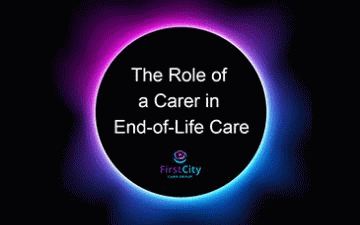The Role of a Carer in End-of-Life Care
- March 05, 2025

End-of-life is often a topic people tend to avoid talking about, but in the health and social care industry it is something we must become familiar with. End of life care is about ensuring the persons final days are what they would want them to be, giving that person a good and comfortable death.
Carers play a pivotal role in end-of-life care, providing essential support to customers and their families during one of life's most challenging phases. Their responsibilities are vast and varied, encompassing not just physical care but also emotional, spiritual, and logistical support. Let's delve into the critical role carers play in ensuring a dignified and comforting end-of-life experience.
Providing Physical Care
Carers are responsible for managing the physical needs of customers, ensuring they are comfortable and free from pain. This includes assisting with daily activities such as bathing and dressing, managing symptoms to improve the customer’s quality of life, and administering certain medications while also working closely with district nurses and other healthcare professionals who may be involved in a person’s medication requirements and overall support.
Offering Emotional Support
End-of-life can be an emotionally overwhelming time for both customers and their families. Carers provide a compassionate presence, offering a listening ear and empathetic support. They support customers to process their emotions, fears, and concerns, providing reassurance and comfort. This emotional support is crucial in helping the individual and their family to navigate the complex feelings that arise during this time.
Facilitating Communication
Effective communication is key in end-of-life care. Carers act as liaisons between the customer, their family, and healthcare professionals, ensuring that everyone's needs and wishes are understood and respected. They help facilitate discussions about care preferences, advance directives, and end-of-life decisions, ensuring that the customers voice is heard and honoured.
Ensuring Dignity and Respect
Carers prioritise always maintaining the dignity and respect of the customer. They are attentive to the personal and cultural preferences of each individual, ensuring that care is delivered in a manner that aligns with the patient's values and beliefs. This respect for individual autonomy is fundamental in providing compassionate and person-centered care.
Providing Spiritual Care
For many patients, spiritual care is an important aspect of end-of-life support. Carers help patients explore their spiritual needs, whether through facilitating religious practices, connecting them with spiritual leaders, or simply offering a comforting presence. This spiritual support helps patients find peace and meaning in their final days.
Supporting Families
Carers also provide invaluable support to families, helping them cope with the emotional and practical challenges of end-of-life care. They offer guidance on caregiving tasks, provide respite to prevent caregiver burnout, and offer emotional support during the grieving process. This holistic support ensures that families are not alone in their journey.
Promoting Comfort and Quality of Life
The primary goal of end-of-life care is to enhance comfort and quality of life. Carers focus on creating a peaceful and comforting environment, whether care is provided at home, in a hospice, or in a hospital. They strive to ensure the person is as comfortable as possible, attending to their needs with kindness and compassion.
Advocating for Customers
Carers advocate for the needs and preferences of the individual, ensuring that their rights and wishes are respected. They work to ensure that person receives appropriate care and support, and they speak up on behalf of them when necessary. This advocacy is crucial in ensuring that the persons voice is heard, and their choices are honoured.
In conclusion, the role of a carer in end-of-life care is multifaceted and deeply impactful. Carers provide essential physical, emotional, spiritual, and logistical support, ensuring that customers and their families receive compassionate and dignified care. Their dedication and empathy make a significant difference in the lives of those they care for, offering comfort, peace, and support during one of life's most profound transitions.
We know it can be difficult to support a customer through end-of-life and would like to remind colleagues to please come and talk to us if you need to. Either call or email your team or head into the office and ask for a chat.








You can also use your social account to sign in. First you need to:
Accept Terms & Conditions and Privacy Policy.